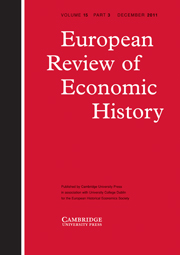Crossref Citations
This article has been cited by the following publications. This list is generated based on data provided by
Crossref.
Quinn, Stephen
2007.
Securitization of Sovereign Debt: Corporations as a Sovereign Debt Restructuring Mechanism in Britain, 1694-1750.
SSRN Electronic Journal,
Hale, Matthew
Hawkins, Richard
and
Wright, Catherine
2008.
List of publications on the economic and social history of Great Britain and Ireland published in 2007.
The Economic History Review,
Vol. 61,
Issue. 4,
p.
949.
Flandreau, Marc
and
Flores, Juan H.
2008.
Bonds and Brands: Foundations of Sovereign Debt Markets, 1820-1830.
SSRN Electronic Journal,
Noiret, Serge
2009.
Publications on financial history 2007.
Financial History Review,
Vol. 16,
Issue. 2,
p.
203.
Flandreau, Marc
and
Flores, Juan H.
2009.
Bonds and Brands: Foundations of Sovereign Debt Markets, 1820–1830.
The Journal of Economic History,
Vol. 69,
Issue. 3,
p.
646.
PRATT, DAVID
SCHOFIELD, P. R.
FRENCH, HENRY
KIRBY, PETER
FREEMAN, MARK
GREAVES, JULIAN
and
PEMBERTON, HUGH
2009.
Review of periodical literature published in 2007.
The Economic History Review,
Vol. 62,
Issue. 1,
p.
153.
Besley, Timothy
and
Persson, Torsten
2009.
The Origins of State Capacity: Property Rights, Taxation, and Politics.
American Economic Review,
Vol. 99,
Issue. 4,
p.
1218.
Zuijderduijn, J.
2010.
The emergence of provincial debt in the county of Holland (thirteenth-sixteenth centuries).
European Review of Economic History,
Vol. 14,
Issue. 3,
p.
335.
HUMPHREY, SHAWN
and
HANSEN, BRADLEY A.
2010.
Constraining the state's ability to employ force: the standing army debates, 1697–99.
Journal of Institutional Economics,
Vol. 6,
Issue. 2,
p.
243.
Cox, Gary W
2011.
War, Moral Hazard, and Ministerial Responsibility: England After the Glorious Revolution.
The Journal of Economic History,
Vol. 71,
Issue. 1,
p.
133.
Gelderblom, Oscar
and
Jonker, Joost
2011.
Public Finance and Economic Growth: The Case of Holland in the Seventeenth Century.
The Journal of Economic History,
Vol. 71,
Issue. 1,
p.
1.
Winton, P.
2012.
The political economy of Swedish absolutism, 1789-1809.
European Review of Economic History,
Vol. 16,
Issue. 4,
p.
430.
Enderlein, Henrik
Trebesch, Christoph
and
von Daniels, Laura
2012.
Sovereign debt disputes: A database on government coerciveness during debt crises.
Journal of International Money and Finance,
Vol. 31,
Issue. 2,
p.
250.
Hohmann, Sebastian
2012.
The Political Economy of Sovereign Default.
COX, GARY W.
2012.
Was the Glorious Revolution a Constitutional Watershed?.
The Journal of Economic History,
Vol. 72,
Issue. 3,
p.
567.
Kim, Jongchul
2012.
How Politics Shaped Modern Banking in Early Modern England: Rethinking the Nature of Representative Democracy, Public Debt, and Modern Banking.
SSRN Electronic Journal,
Eichengreen, Barry
2013.
ADB Distinguished Lecture Renminbi Internationalization: Tempest in a Teapot?.
SSRN Electronic Journal,
Livesey, James
2013.
Free Trade and Empire in the Anglo-Irish Commercial Propositions of 1785.
Journal of British Studies,
Vol. 52,
Issue. 1,
p.
103.
Eichengreen, Barry
2013.
ADB Distinguished Lecture Renminbi Internationalization: Tempest in a Teapot?.
Asian Development Review,
Vol. 30,
Issue. 1,
p.
148.
MURPHY, ANNE L.
2013.
Demanding ‘credible commitment’: public reactions to the failures of the early financial revolution1.
The Economic History Review,
Vol. 66,
Issue. 1,
p.
178.


